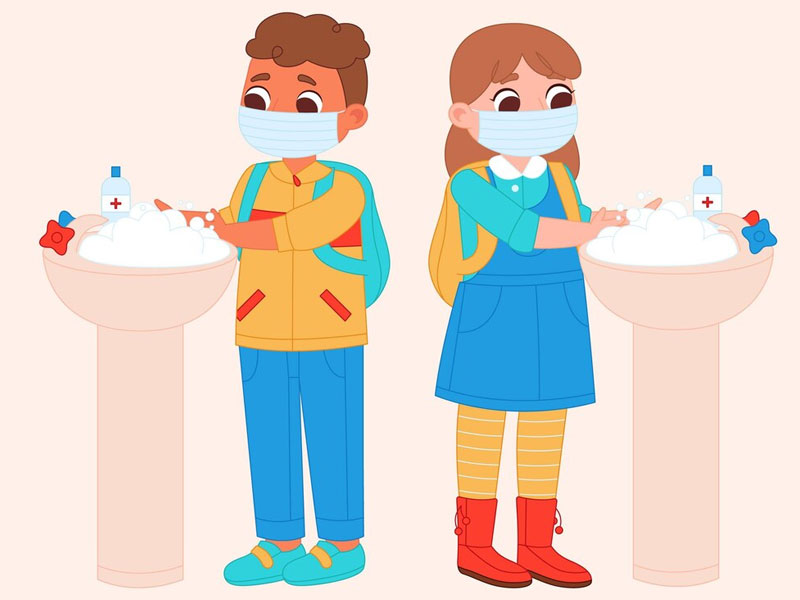
Washing hands is one of the most basic things one can do to prevent disease, yet it is often ignored. But COVID-19 has now taught the world the importance of practising proper hand hygiene. Almost everyone is now familiar with the steps of hand washing including the correct soaping techniques. Since hands are the most-used part of our body, keeping them clean can protect young children from transfer of germs and getting contagious infections. Now that schools are slowly reopening and kids are exposed, it is essential to teach children how to maintain hand hygiene from a young age. In this article, Dr. Nitin M, Consultant - Paediatrician & Neonatologist at Motherhood Hospitals, Electronic City, Bangalore is explaining how parents can teach hand hygiene basics to their kids.
Table of Content:-
Why should you wash your hands?
Let us understand the benefits of washing hands with soap!
- Children constantly touch their eyes, nose, and mouth with their hands without even realizing it! If their hands remain unwashed, germs can easily enter their body and make them sick.
- Germs from unwashed hands can get transferred to food items and make children sick.
- Dirty hands can also transfer germs to daily use items such as toys, furniture, and even clothes!
- Washing hands helps to prevent infections, especially diarrhoea and respiratory infections, and also skin and eye infections.
Also Read: Don’t let Handwashing Dry Out Your hands, Maintain Softness With These 7 Tips
How do you wash your hands properly?

Follow these steps to keep your hands clean:
Step 1: Wet your hands with running water (warm or cold). Remember to turn off the faucet so that you don’t waste water!
Step 2: Apply soap to your hands and scrub until good lather forms. Regular soaps are fine. Healthcare professionals should use antibacterial soap.
Step 3: Rub your soapy hands together for at least 20 seconds. (Play a short song as timer!) Don’t forget to clean back of your nails, space between fingers and also under your nails!
Step 4: Rinse your hands with clean running water to wash away the dirt.
Step 5: Dry your wet hands with a clean towel or hand dryer.
- CDC simply puts it as wet, lather, scrub, rinse and dry!
- When should kids wash their hands?
Also Read: What Is The Link Between Your Mental Health & Hygiene
Ideally wash frequently, practically may not be possible though! Handwashing after using the washroom, before eating, after touching pets or any dirty objects, after playing outside, and importantly after touching ill humans, after coughing, sneezing, or blowing their nose.
Why not use hand sanitizer?
Washing hands is the best way to get rid of all germs, as sanitizers cannot remove them all, not effective when hand is visibly dirt, and also cant remove chemicals. If soap and water is not available you can use alcohol based hand sanitizer, it should contain at least 60% alcohol.
Hand Hygiene Guide For School-Going Kids
Parents should teach their young children the proper technique to handle soap and wash hands on their own. Make it a habit!

- Think of fun ways of hand-washing for kids to make this activity more enjoyable.
- As every child is unique and a parent knows their child the best, they should create a strategy that will work best for their baby.
- Young children tend to wash their hands quickly! Make sure it lasts at least 20 seconds. Parents can create a counting song or a rhyming poem that lasts for 20-30 seconds to ensure that their child is washing hands for at least as long as the music lasts.
- Choosing a fun, colourful soap in interesting shapes can make children excited to use it while washing their hands. Nowadays, soaps with cartoon characters are also available for young kids.
Takeaway
Not washing hands properly with soap might not seem like a huge problem, but as we have learnt the hard way, it can lead to more severe health concerns. Therefore, it is crucial to have your child develop a habit of following good hygiene. Activities such as hand-washing, showering, brushing teeth, and combing hair can make them feel more confident and healthy.
Image credits- freepik
Also watch this video
How we keep this article up to date:
We work with experts and keep a close eye on the latest in health and wellness. Whenever there is a new research or helpful information, we update our articles with accurate and useful advice.
Current Version